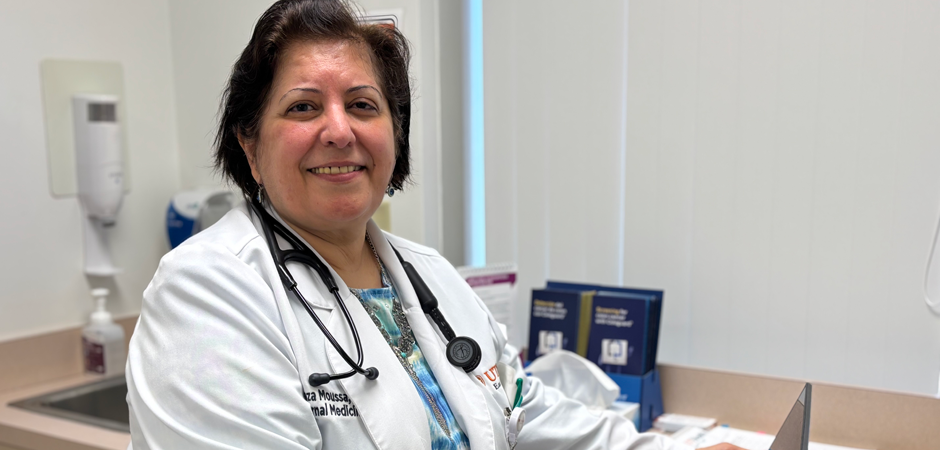
Dr. Shaza Moussa, an internal medicine physician at UT Health Jacksonville, remembers the day 12 years ago that changed her life forever.
Moussa had been a practicing pediatrician in Syria for more than 20 years, the ongoing war increasingly affecting her family’s daily life, to the point she and her husband went to different churches to ensure their three children would have a surviving parent in case one of the churches were bombed while they attended service.
The life-changing call came early on the morning of March 12, 2013 – her teenaged daughter screaming as she tried to cross the street to get to school for exams. There had been a bombing near their private Catholic school that morning, but her two daughters, ages 15 and 16, urged their driver to take them to the school so that they wouldn’t miss their exams.
“She called me shouting and crying. She said, ‘They are shooting me!’” Moussa said. “I’m hearing the bullets of the guns they’re using. I am shouting, ‘Where are you?’” For five long minutes, Moussa sat on the line, not knowing what happened to her daughter, until one of her teachers finally came on the line and said her daughter was safe, a soldier had pushed her into a building to escape the gunfire. “It was five minutes where I felt like I had died,” Moussa said.
She knew then that something had to change, and she and her husband were able to get visas for their daughters to come to the U.S., settling with her brother who is an interventional cardiologist in Longview.
Two months later, Moussa and her 7-year-old son arrived in Longview for a two-week visit, at the end of which she had hoped to take her daughters back home to Syria, thinking the situation might have improved by then. She didn’t close her office when she left, thinking she’d be back in a couple weeks. However, everyone she spoke with back home said the situation was only getting worse. And her daughters said they finally felt safe in their new surroundings.
It was then that she knew she wouldn’t be going home and began applying for asylum, which she was granted.
“I started thinking, ‘I need to work. My license isn’t approved here,’” Moussa said. “I had to start at point zero in medicine.”
So Moussa did what she had to—she worked as a medical assistant for two and a half years while she studied for her medical licensing exams. “It was a struggle every day. Every day I used to cry,” she said.
But she persevered, passed her exams and then began residency in internal medicine.
“It was a struggle to do residency at age 55 (because) it’s designed for young people. But with God’s help I did it, graduated and I’m now board certified,” Moussa said. “I was the only one who was working, and I have three kids to support, so I have no way to look back, just to look forward.”
Moussa continued to look forward as her three children found success in their schooling and beyond, her daughters graduating from Tufts University and Emory University and her son, now 19, enrolled at Texas A&M on a pre-med track.
Moussa said her passion for medicine is fueled by her desire to serve and give back to a community that has given so much to her and her family.
“I got helped when I came here as a refugee. I feel like I need to give back the kindness to everybody who helped me,” she said. “I feel like kindness is like a circle — you will pay it back not to the same people, but you will spread it around. And they will help somebody else and that’s how the circle goes.
“I want everybody to know, especially women who are stressed and feel helpless, it’s never too late. There’s always hope, there’s always a way.”
